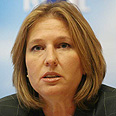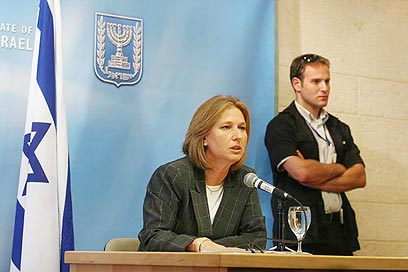
Livni: Diplomatic process undertaken
Foreign Minister Tzipi Livni states diplomatic process is not aimed at shortening IDF operation; UN envoy says Israel, Lebanon understand need for political solution to crisis
Has diplomatic process kicked off? Foreign Minister Tzipi Livni met members of a United Nations special delegation to the Middle East on Tuesday regarding the conflict in Lebanon.
The envoys - Secretary General Kofi Annan's special political advisor Vijay Nambiar, special envoy to Syria and Lebanon Terje Roed-Larsen (who was appointed to see the implementation of Resolution 1559) and UN Mideast envoy Alvaro de Soto - arrived in Jerusalem from Beirut, where they met Prime Minister Fouad Siniora.
Livni said Israel was engaged in talks with the international community, but stressed that diplomacy would not curtail the IDF's operations in Lebanon.
"The diplomatic aims are long-term," Livni said. "So far, diplomacy has successfully focused on gaining international support for the IDF operation, and now we are moving on to the next stage. G8 and European Union statements over the last few days prove that Israel and the international community have common understandings and common goals," Livni said.
"The common understanding is that responsibility for escalations in the north lies with Hizbullah, and is linked to the Hamas and the the conflict with the Palestinians. There is a general understanding that a cease-fire for the sake of a cease-fire is not enough, but rests on the unconditional return of the kidnapped soldiers and full implementation of UN resolution 1559 to prevent Hizbullah from continuing to be a provocateur in the region," she added.

Livni. Expectations from international community (Photo: Gil Yohanan)
The foreign minister further stated: "I expressed my position and expectations from the international community. Regarding the kidnapping of the three soldiers, whether accomplished by digging tunnels from Gaza or by infiltrating from Lebanon, such acts are completely unacceptable and cannot in any way be legitimized by the international community. We need to remember that not only Israel but the rest of the international community is struggling against similar situations all over the world, and therefore the interest of Israel and the international community is to relay a message to terror groups that this path (of violence) will not achieve political aims or strengthen them."
'Lebanese gov't failed'
Livni stressed the need to implement UN resolution 1559. "Hizbullah must be expelled from the Lebanese border, to uphold resolution 1559, which means the deployment of the Lebanese army in south Lebanon and disarmament of Hizbullah. Also, Iran and Syria must be prevented from arming Hizbullah in the future. These are our political aims and we will achieve them by working with the international community.
"It is not a secret that the Lebanese government failed to implement 1559. Instead, Siniora decided to launch international dialogue with Hizbullah, claiming it wanted to avoid civil war," Livni said. She added that IDF operations have weakened Hizbullah, and the Lebanese government can act easily and in many ways. "The IDF operation has done the Lebanese government and the international community a favor," she noted.
Speaking about the possibility of sending international troops to Lebanon, Livni said: "UNIFIL's performance in the past was unastisfying. We will consider which options will be satisfactory. Our criteria are the implementation of resolution 1559 and the redeployment of the Lebanese army to the south. If there are problems in terms of effectiveness, we will discuss further ideas."
Larsen: Concrete ideas
Mideast envoy Terje Larsen said during the press conference that the discussion with the minister was very positive and very intense and that the delegation presented concrete, specific and consolidated ideas in regards to a solution to the current crisis. "I think that both sides comprehend that they have to find a political framework to achieve a ceasefire," he said.
Larsen said that the Israeli government would discuss the proposals brought up in the discussion, as would the Lebanese government. "I hope that we will be able to continue dialogue in the coming days," Larsen said.
"We cannot present all the ideas discussed because this will damage the chances of successfully ending this conflict. We are working with all our might to bring an end to the current crisis," Larsen explained why he was unable to reveal details of the discussion.
In the meantime, Annan said that EU soldiers would join a proposed international force to stabilize the situation in southern Lebanon. Earlier, British Foreign Minister Margaret Beckett said that sending an international stabilization force to the area was possibly the best way to protect a ceasefire agreement.
The Prime Minister's Office told Ynet Monday night, the eve of international mediation attempts between Israel and Lebanon, that "there is no deadline by which the IDF must finish its operations - not this weekend, not the beginning of next week, not any other date. As such, the military operation will continue until its objectives, set forth by the prime minister and the Knesset, have been achieved."
Ronny Sofer contributed to the report
Video courtesy of the Foreign Ministry










